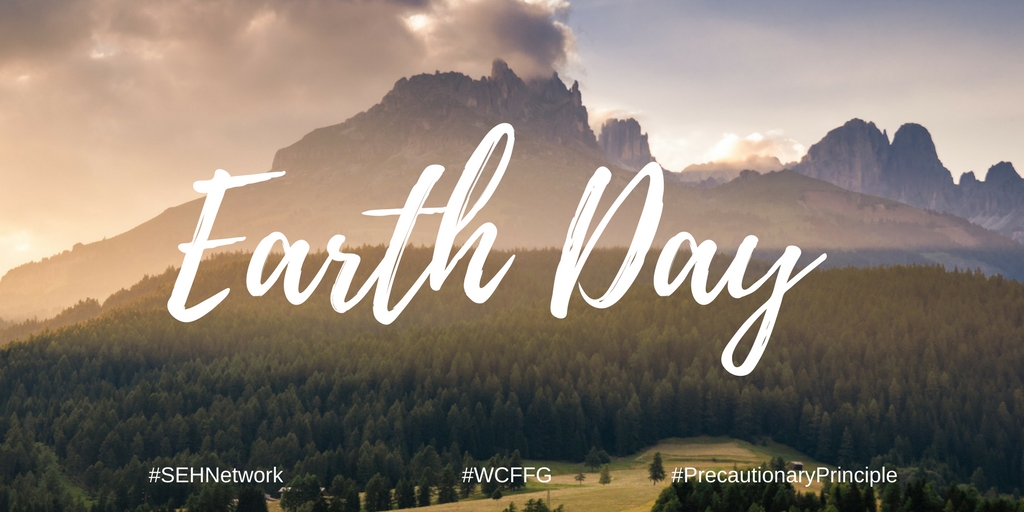Earth Day 2018
The Precautionary Principle, Kristen Bell, and Happiness vs. Suffering
I have been spinning my wheels for the past few days thinking about possible topics for Earth Day. Yes, every organization will be spamming the inboxes of potential donors and volunteers on Sunday and talking about the critical environmental issues of our time-- there are shortages of resources, water, and funding but certainly no shortage of environmental concerns and critical issues. It is the crushing reality of our time.
And so, while I encourage you to donate, stop using straws, reduce your plastic waste & carbon footprint, and educate yourself on current environmental issues, I wanted to take a moment to share an idea that I have been ruminating on for a few weeks; a shadowy idea that eluded me until it was forced out into the light of day during a relatively normal work call.
Like many people, I spend an unfortunate amount of time sitting in my car on 695-- avoiding potholes and distracted drivers on their phones, applying their makeup, and eating their breakfast-- completely unaware that they are about to crash into me. I have always been a fan of listening to books-on-tape in the car and, as technology has progressed, podcasts.
A serious fan of Kristen Bell following the Veronica Mars years, I jumped at the opportunity to listen to her being interviewed by her husband, Dax Shepard on his podcast, Armchair Expert.
First of all, I really like them. They are Hollywood actors, but they are also real people, and that level of gritty authenticity is something I value in others and value in them.
The episode was entertaining, of course, but there was one thing that really stuck with me; during the interview Kristen talks about how she operates on the moral code of “happiness versus suffering”. She doesn’t want to suffer, she would rather be happy. In her mind, you should make decisions in a way that mitigates and prevents suffering for yourself AND for others.
That in and of itself is not exactly revelatory, I know. However, it IS, at its very core, the precautionary principle. The precautionary principle asks “how much harm is avoidable” and is generally referenced as a tool to inform policy and decision making in the environmental field and beyond. But it’s more than that, too. The precautionary principle IS happiness (and wellness) versus suffering and it can be applied to every aspect of our lives.
As a person with very real anxiety, I have often felt like the precautionary principle is ingrained into my every thought and decision-- if I do this, then what could possibly happen? Will it affect anyone else? Are we going to be safe? (and so on and so forth). I have an intimate sense of foresight. I literally cannot stop having foresight and caution. While this can be extremely annoying when I’m trying to plan a backpacking trip with friends or figuring out which route to take while driving somewhere new, it is incredibly important to have when making decisions about our land, water, and shared resources that will, for better or for worse, impact our neighbors and future generations.
Having worked with SEHN for a short time now, I have had many opportunities to think about the precautionary principle and its usefulness in protecting all living things. However, I have also had the opportunity to see it as more than a tool for policy and decision-making. As usual, it took a phone call and conversation with someone far more knowledgeable than myself to give words to the ideas that had begun to take form in the corners of my mind.
In a recent afternoon chat with SEHN executive director and brilliant mind, Carolyn Raffensperger, I finally had clarity. The precautionary principle IS happiness versus suffering. In Carolyn’s words, it is the ethical precept of preventing suffering. While some suffering is an inescapable part of the human condition (i.e. heartbreak, conflict, and growth), some suffering is preventable (i.e. climate-related illnesses, exposure to toxins and chemicals, environmental injustice, pollution in the form of trash, noise, and light, etc.) If we have the ability to prevent or even delay suffering (such as the onset of neurodegenerative diseases like Alzheimer's), then it is our responsibility to prevent or delay it.
Because, at the end of the day, we don’t want to suffer and we don’t want those we love to suffer. We want to live with the precautionary principle in mind, in every aspect of our lives, every single day. Because, really, every single day is Earth Day and, given a say, we choose happiness and wellness every single time.
Kayhla Cornell 2018


